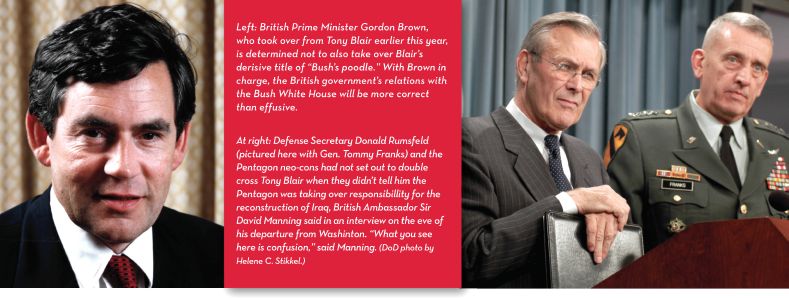|
NOT NECESSARILY BY COINCIDENCE, "the most concrete sign yet of a thaw in French-American relations ."Just what form the French effort would take was not clear, but there was talk of a French-sponsored peace conference either in Paris or in an Arab location. Not necessarily by coincidence, France's dynamic new president is pushing rapprochement with Washington at a time when the fuzzy warmth of the Bush-Blair relationship has begun to melt under the cold gaze ofTony Blair's more pragmatic and unsentimental successor, Gordon Brown. His inaugural visit to Washington in July blew a chill Scottish Highland wind (Brown is a Scot) across the so-called "special relationship." The atmosphere was correct, but "Tony" and "George" had given way to "Mr. President" and "Mr. Prime Minister." Britain's intention to pull out of Basra was already known to the Bush administration, but on such issues as global warming and aiding the poor, both high priorities for Brown's government, the two leaders seemed to be "talking from different galaxies," as one European official put it. Blair used to come out of his meetings with Bush rhapsodizing breathlessly about what a thrill it all was. Brown shook his American hosts by publicly describing his talks with Bush as "full and frank discussions," a phrase exhumed from the Cold War when it meant "we couldn't agree on anything." For Gordon Brown distancing himself from George Bush was a priority. He faces a general election early next year, and he had seen how strong loyalty to Bush had damaged Blair politically at home. The derisive nickname of "Bush's poodle" was a mantle he did not want to inherit from his predecessor. So is the stage set for Sarkozy to become Bush's French poodle? Unlikely, analysts say. Underlying Sarkozy s speech to the ambassadors was the message that France should look beyond the Bush administration because Bush is already a lame duck. The cyclical four-yearly pause in doing serious business with Washington got off to an early start this year because, with 14 months to go, the presidential campaign is already well under way and, in Europe as elsewhere, the waiting game has begun. Also, as the European official points out, "Sarkozy defines relations with the United States as friends with privileges — the privilege to disagree on certain issues without going to the barricades." There will be disputes when French interests clash directly with American interests, but Sarkozy argues that good will on both sides should prevent the relationship from going sour. Time will tell, since Sarkozy is not the man to roll over and play dead, as Blair apparently had to do from time to time to preserve the special relationship. This month, the departing British ambassador, Sir David Manning, delivered a waspish parting shot that the White House didn't always keep Tony Blair in the loop about Iraq and that the current situation couldn't be called anything but a failure. Taking time away from the round of goodbye parties, the very popular, mild-mannered ambassador, who had been Blair's foreign policy adviser during the war prior to his stint in Washington, told the New Statesman magazine that the Bush administration failed toconsult its main ally about some of its major decisions — or even advise them once the decisions were made. The Guardian newspaper called Manning's interview "an extraordinary admission of British lack of influence on the key decisions made in Washington." Bush and Blair might have shared the same brand of toothpaste — as the president said after the British prime minister's first visit — but Sir David reveals that when it came to sharing information it was a different story. Bush, for example, didn't tell Blair of the decision to make Donald Rumsfeld's Pentagon, rather than the State Department, responsible for the post-war reconstruction of Iraq. The British learned of this when Rumsfeld scrapped the detailed postwar plan laboriously prepared by State and the British Foreign Office. "I did not know that the (Pentagon) was going to take over the running of the country," Manning complains in the New Statesman interview. "We didn't have any sense that this was about to be the way post-war Iraq was going to be run." Manning more than implies that the decision to disband the Iraqi army and make a clean sweep of all Baath party supporters from the bureaucracy was made over British objections. Blair, says Manning, was "always in favor of regime change, but that did not mean that he wanted regime change through military means ... he hoped and probably believed that that there was a way of getting there by using the United Nation to put pressure on Saddam Hussein. I don't think he ever wanted to go by the military route." As for the war's aftermath, "I don't think anybody can see the immediate postwar situation as anything other than a failure." According to a recent profile of Nicolas Sarkozy by the French playwright Yasmina Reza, France's new president matches his short stature with an equally short fuse. Faced with the same circumstances it is hard to imagine him maintaining a politically sacrificial silence for five years, as Blair did. But Blair didn't think shouting loudly would have resolved his differences with the White House. "On the whole, British politicians don't do it that way," Manning states. "I don't think they set out to double cross the prime minister," the ambassador adds lamely. "I think what you see here is confusion," he concludes, as if that were any better.
|

